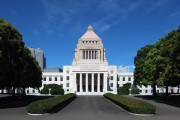As expected, Abe’s bill passed in the Lower House today as politicians from the opposing parties staged a walk-out.
The bill will now go for deliberation in the Upper House, where it is expected to pass due to the LDP majority. The bill marks a great change in Japan’s political trajectory since the end of WWII because it could allow Japan to begin sending troops to fight in international conflicts.
Meanwhile, throughout Japan there have been protests opposing the bill, standing in contrast to those who support the Prime Minister and the LDP.
Netizens have not quite made up their minds, with some in favor of the decision while others think it sets a dangerous precedent.
From Yahoo! Japan:
Security Bill Passed In Lower House; On Way To Adoption In Current Diet Session, Forced Through By Ruling Party
The security bill which has been the key focus of the current Diet session went to a vote during a Lower House plenary session on the afternoon of July 16, and was passed with a ruling party majority. It has now been sent for debate in the Upper House.
Based on this, the adoption of the bill during this session of the Diet, which runs through September 27, becomes a certainty. Now that the way has been paved for the adoption of the security treaty, which will make it possible for Japan to exercise its right to collective self-defense based on a change in the interpretation of the current constitution, this marks a major transition for postwar Japanese security policy.
Four parties — the DPJ, the JIP, the JCP and the SDP — who are requesting a continuation of deliberations in the Lower House, walked out prior to the vote in order to display their opposition to the ruling party forcing the vote through. The People’s Life Party did not attend the vote from the outset. The Party For Future Generations agreed with the bill.
At an LDP party meeting prior to the plenary session at the Lower House, Abe Shinzo addressed the representatives, saying: “We have a grave responsibility to protect Japan’s land, Japan’s seas, and Japan’s skies. Let’s fulfill this responsibility in the Lower House”. But Okuda Katsuya of the opposing DPJ criticized this harshly in a debate before the vote at the plenary session, saying that allowing the enactment of the right to collective self-defense was “nothing short of unconstitutional”. He demanded that the bill be withdrawn, saying “voices of opposition to the bill are growing louder than ever before”.
If the Upper House does not reach a decision on the bill 60 days from September 14, then it is assumed that it has been rejected, in which case there is the possibility that the constitution’s “60 day rule” could be applied, which would mean the bill can be passed again in the Lower House. In this instance, the enactment of the bill during the current session of the Diet would reach an impasse.
The security bill consists of the “Act Outlining Provisions For Peace And Safety” in which there are ten clauses for reform including the Self-Defense Forces Law, and two further clauses relating to a new law, the “Support For International Peace Act”, which would make it possible for Japan to deploy troops overseas at any given time. The revisions to Armed Attacked Situation Law, from which the Provisions Act is composed, prescribes anew cases which would be recognized as a clear danger that Japan’s existence is threatened and/or which would usurp the rights of the Japanese people as “crisis situations that threaten Japan’s existence”.
Throughout the course of the Lower House deliberations many constitutional scholars and those who have served on the administration of the Cabinet Legislation Bureau have indicated that the security bill is “unconstitutional”, alongside the opposition parties. Even the Prime Minister himself acknowledged at a meeting of the Lower House Special Committee on Peace and Security Legislation that “The people’s understanding of the bill has not progressed at all”, but he would not back down on over the bill’s passing on July 16.
Comments from Yahoo! Japan:
spa*****:
In either case, first of all I wish young people would use this as an opportunity to get interested in politics, even if it’s only a little! And they should participate in elections! If you disagree with the way politics is going right now, then you have to start with that!
kei*****:
It’s just like a chess problem.
We knew that this would happen at the point the LDP got the overwhelming majority in the election last year, didn’t we?
Those who are opposing the bill should have made their feelings known before the checkmate.
kay*****:
I’ve always wondered about this since I was in high school, but why do they walk out…?
Why can’t they see things through to the end?
Is it because they think they don’t need to be there just because they disagree?
If so, then what do those people who actually voted for the parties that walked out think?
I think that politicians should have a stronger sense of their responsibility, and that every Diet member should do their job.
ken*****:
Those peace-crazy fools won’t go unchallenged any more.
loo*****:
I’m not sure about forcing the vote through, but it’s hardly a good battle tactic to walk out or not even show up at the time of the vote.
Even if they knew they would lose, I think it’s cowardly to just run away from it.
kyo*****:
The Japan Innovation Party is just a complete mess.
cjq*****:
I was really disappointed in the Japan Innovation Party -_-b
a*****:
That is some trolling to say that the vote was forced through, but even when the DPJ was in power, they forced through votes and stuff several times.
Zip****:
If this is unconstitutional, then the usual think to do would be to change the constitution, but I’m not sure where we are now.
There’s no meaning in having a constitution at all. And anyway, the Diet that we have now is a gathering of Diet members who were elected in an unconstitutional situation in the first place.
y26*****:
If they don’t like it, then the opposition parties will just have to win an election. But as they are right now, they’re never going to win, are they?
Comments from Twitter:
エックスマス:
I’m glad there is the prospect that this bill will be enacted.
I’m pretty sure that the people of Ishigaki City in Okinawa [which includes the disputed Senkaku Islands] will be somewhat relieved.
James_休養中:
Recently, Abe Shinzo has started to seem like Wilhelm II…ah, may be never become him.
ヒナ娘:
If it comes to a war, then let’s send the sons of the LDP and the Komeito to fight for us on the front under their guidance and supervision!
登美ちゃん:
Hmmm…are things gonna be OK for Japan from now on? Because I never had any doubts that I was living in a time of peace. Worrying.
ヒロ:
From the perspective of national defense, then some kind of strategy is necessary. Still, not sure about forcing a vote through by ignoring the constitution, especially when the people of Japan don’t really understand what’s going on. Well, I don’t suppose that the Self-Defense Forces will be sent anywhere dangerous before next year’s election is over.
YOSHI-K:
I still don’t get it, but how do those who oppose this think we should deal with the very apparent threat of China? Do they think that “If Japan devotes itself to unarmed pacifism, then China will open its’ heart!”?!
暇人⑨
Don’t skip votes you money-guzzling bastards!
ocean1018:
PM Abe is getting a bit too strong. It’s dangerous.








